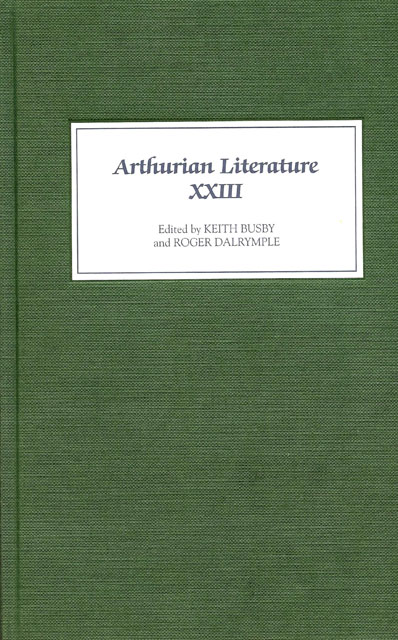Book contents
- Frontmatter
- Contents
- General Editor’s Foreword
- I Beyond Shame: Chivalric Cowardice and Arthurian Narrative
- II Malory’s Forty Knights
- III Fooling with Language: Sir Dinadan in Malory’s Morte Darthur
- IV William Caxton, Wynkyn de Worde and the Editing of Malory’s Morte Darthur
- V Ballad and Popular Romance in the Percy Folio
- VI Local Hero: Gawain and the Politics of Arthurianism
- VII Promise-postponement Device in The Awntyrs Off Arthure: a Possible Narrative Model
- VIII L’Atre perilleux and the Erasure of Identity
- IX The Theme of the Handsome Coward in the Post-Vulgate Queste del Saint Graal
- X A Time of Gifts? Jean de Nesle, William A. Nitze and The Perlesvaus
- XI Thomas Love Peacock’s The Misfortunes of Elphin and the Romantic Arthur
- Contents of Previous Volumes
IV - William Caxton, Wynkyn de Worde and the Editing of Malory’s Morte Darthur
Published online by Cambridge University Press: 23 March 2023
- Frontmatter
- Contents
- General Editor’s Foreword
- I Beyond Shame: Chivalric Cowardice and Arthurian Narrative
- II Malory’s Forty Knights
- III Fooling with Language: Sir Dinadan in Malory’s Morte Darthur
- IV William Caxton, Wynkyn de Worde and the Editing of Malory’s Morte Darthur
- V Ballad and Popular Romance in the Percy Folio
- VI Local Hero: Gawain and the Politics of Arthurianism
- VII Promise-postponement Device in The Awntyrs Off Arthure: a Possible Narrative Model
- VIII L’Atre perilleux and the Erasure of Identity
- IX The Theme of the Handsome Coward in the Post-Vulgate Queste del Saint Graal
- X A Time of Gifts? Jean de Nesle, William A. Nitze and The Perlesvaus
- XI Thomas Love Peacock’s The Misfortunes of Elphin and the Romantic Arthur
- Contents of Previous Volumes
Summary
Derek Pearsall first pointed out to me that the last four lines of verse in Chaucer's Canterbury Tales – thus arguably the last four lines of verse he ever wrote – had been moved about by F. N. Robinson so that Chaucer's last word prior to the Parson's Tale is no longer ‘grace’ but is now ‘manere’. I was shocked to learn that Robinson had been so cavalier in his editing.
Sir Thomas Malory's Morte Darthur has suffered equally great editorial interventions. Like Tom Sawyer washed and dressed for church by Aunt Polly, the edited Morte bears little resemblance to its original nature. When Malory wrote it, he envisioned a certain way of presenting his text – a presentation embodying conventions we now find strange. We find those conventions strange because we do not, for the most part, work with manuscripts. Malory, however, knew only manuscripts. Writing his Morte, he used the stylistic conventions of the manuscript age. We moderns, separated from Malory's conventions by centuries of editorial intervention following the coming of the printing press, can have only a reduced idea of his abilities as a stylist. A few comparisons will quickly show how much Malory's text has been altered by printer-editors; looking at the original state of the text will suggest that Malory is a better stylist, certainly a different stylist, than appears in any edited version postdating the surviving manuscript.
I must note the influence on my thinking of Jerome J. McGann, who followed up the pioneering work of British scholar D. F. McKenzie in his 1983 A Critique of Textual Criticism and in many works since. McGann’s core insight is to affirm both the lexical and bibliographical texts of a work. The lexical text, of course, is simply the words; the bibliographical text is the visual presentation of those words, including such items as the mise-en-page, illustrations if any, paragraphing, capitalization or lack thereof, type style and size, arrangement in columns, punctuation and so forth. Modern editors have for the most part been faithful to lexical texts, as Robinson largely is to the lexical text of Chaucer's Ellesmere Manuscript. The bibliographical text, however, they have treated with the ruthless hands of Aunt Polly, rearranging lines, typography, pages, etc., to fit their own ideas of proper presentation – a treatment no less ruthless for being well intentioned.
- Type
- Chapter
- Information
- Arthurian Literature XXIII , pp. 46 - 67Publisher: Boydell & BrewerPrint publication year: 2006



